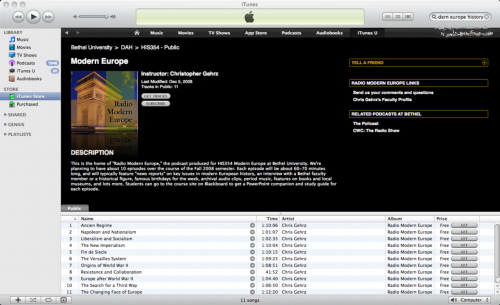Was your New Year’s Resolution to become familiar with European history? If so, you’re going to love our recommendation for an entertaining way to survey European history from the French Revolution to the present day. If you have a long commute, you’ll especially like the medium: hour-long audio tracks, produced by a history professor. But it is certainly not a dry lecture series.
 At Bethel University, history professor Chris Gehrz produced a podcast called Radio Modern Europe for his course, HIS354 Modern Europe. The format is clever, using multiple means of presenting the material: short lectures, of course, but also breaking news bits, simulated interviews with historical figures, and even recipes.
At Bethel University, history professor Chris Gehrz produced a podcast called Radio Modern Europe for his course, HIS354 Modern Europe. The format is clever, using multiple means of presenting the material: short lectures, of course, but also breaking news bits, simulated interviews with historical figures, and even recipes.
The easiest way to access Gehrz’s podcasts is through iTunes, by looking up “Modern Europe History” in the iTunes U section of the iTunes Store and finding the Bethel University option. (Or simply clicking here, which hopefully will launch iTunes and send it directly to the correct place.) Don’t worry, the series doesn’t cost anything: Just click on “Subscribe” or “Get Tracks”.
If you don’t want to use iTunes, you may be able to get the tracks from a sort of RSS feed, linked here. But using that link may take some hacking around.
I just finished the third of 11 tracks, “Liberalism and Socialism”, so I can’t write a proper review of the entire series. But it’s good enough to recommend that you follow along with me. Gehrz presents what I would consider the mainstream version of European history.  That’s no defect in the podcast, given its assumption that the listener knows little about Europe. (And I should mention that the audio tracks are not the only source of information for the intended audience: students who spend much more time on a full college course.) A novice like myself should start with the orthodox view, after all.
That’s no defect in the podcast, given its assumption that the listener knows little about Europe. (And I should mention that the audio tracks are not the only source of information for the intended audience: students who spend much more time on a full college course.) A novice like myself should start with the orthodox view, after all.
In some sections, Gehrz refers to slideshow presentations available through Blackboard, which is a kind of private Lotus Notes (or bulletin board) for colleges. It’s too bad we can’t follow along with his students, but the podcast lessons work pretty well by themselves, if you’d just like an idea of how Europe became the place we know today.

5 Comments to “European History 101, painlessly”
29 January 2010
I also just finished the Third Episode. In the Karl Marx interview, I find it interesting that Marx was not only wrong about Communism, he was also wrong about the Twins overtaking the White Sox for the 2008 AL Central Division Title. GO SOX!
30 January 2010
Yeah, the interviews are my least favorite part of the podcasts. They don’t seem to do much prep work for them, and they often seem misleading to me. (After all, Marx was right about communism, correct?)
31 January 2010
Well, this is probably a question you and I would differ in answering….
For me, I don’t love the holes. For example, the French Revolution is a big hole in my knowledge of history. Since this podcast supplements his classes, we miss the events of the French Revolution. We get setup for the French Revolution, and then we get Napoleon. Something is missing here.
3 March 2010
OK, I’ve finished the series. I thought it was a great series and very informative. I especially enjoyed the impromptu “Search for a Third Way” podcast, which discussed the create of the welfare state in Europe and the political parties that have dominated European politics since the Second World War. I’ve always wonder what distinguished a Social Democrat from a Christian Democrat, and now I have a pretty good idea.
Trackbacks & Pingbacks
Most popular posts of 2010 · Bakker Bugle Blog
Pingback on December 31st, 2010 at 14:37